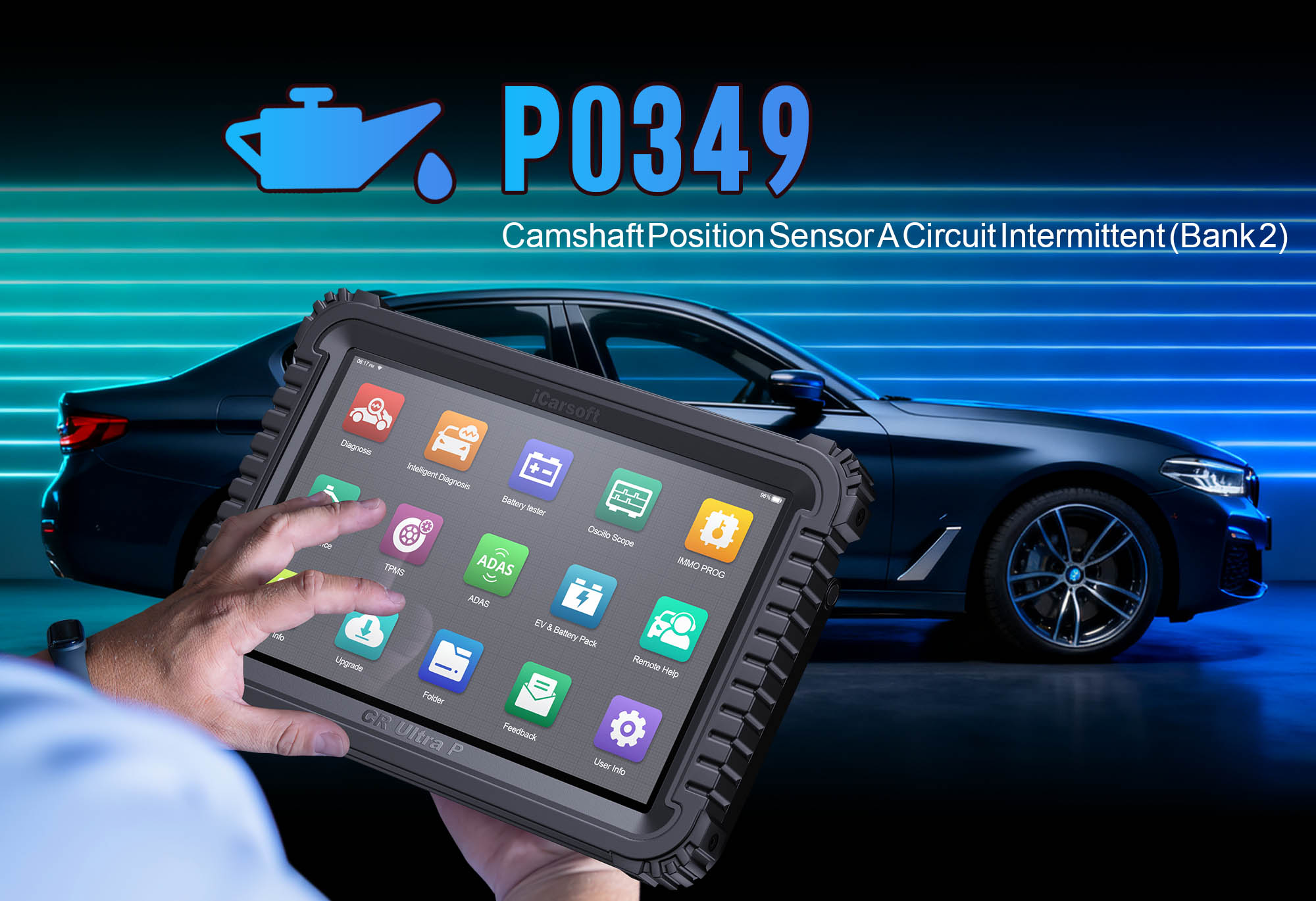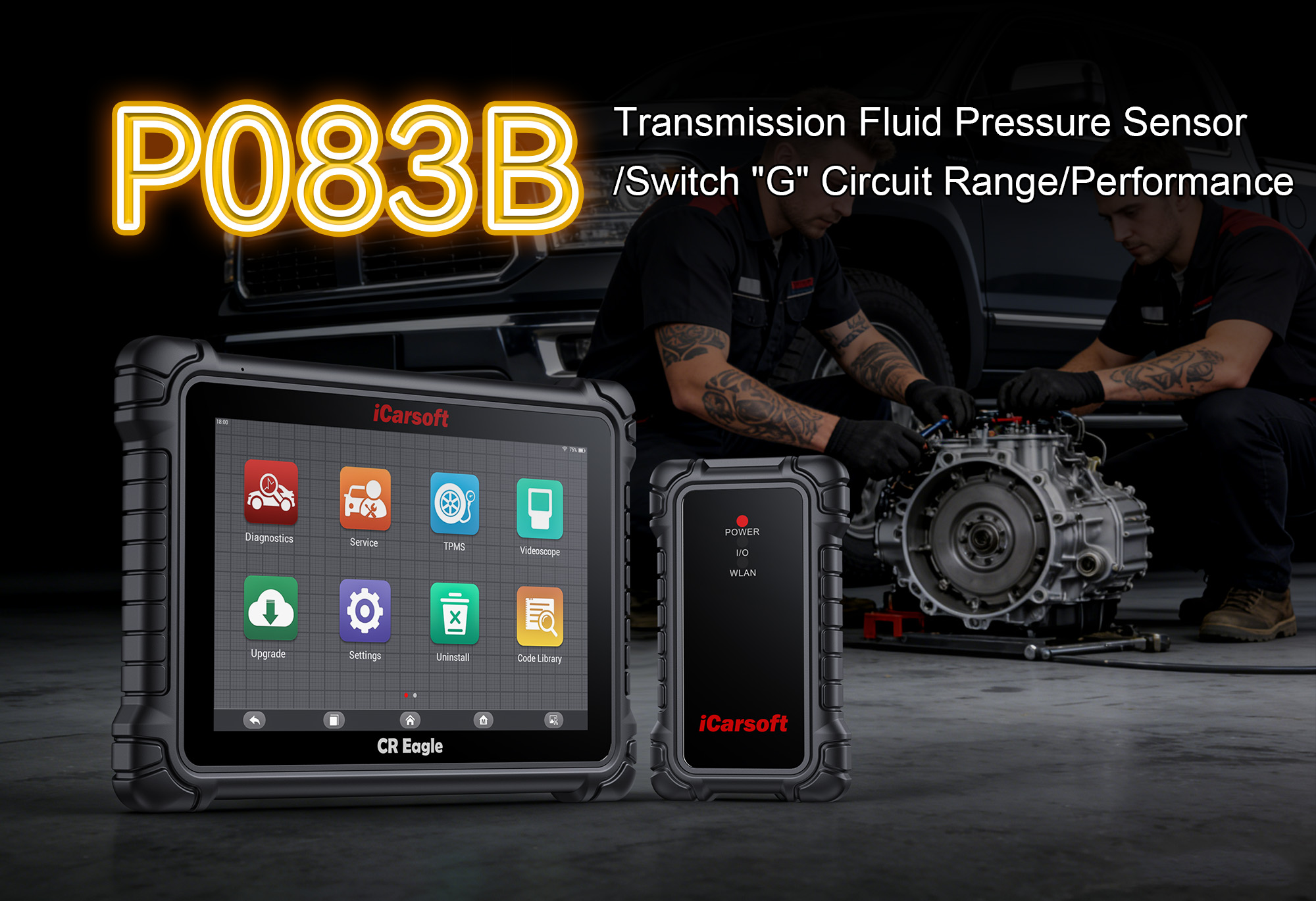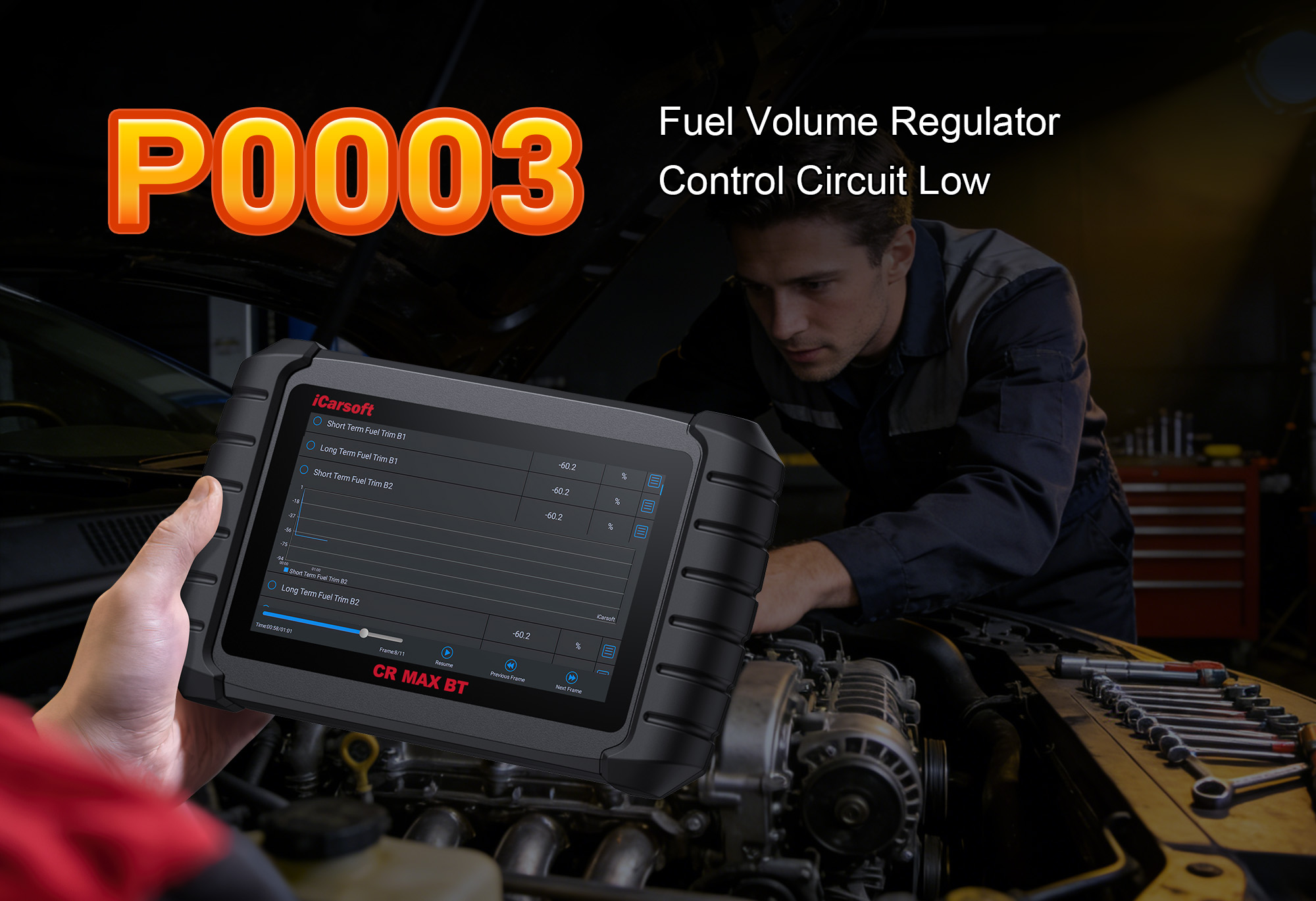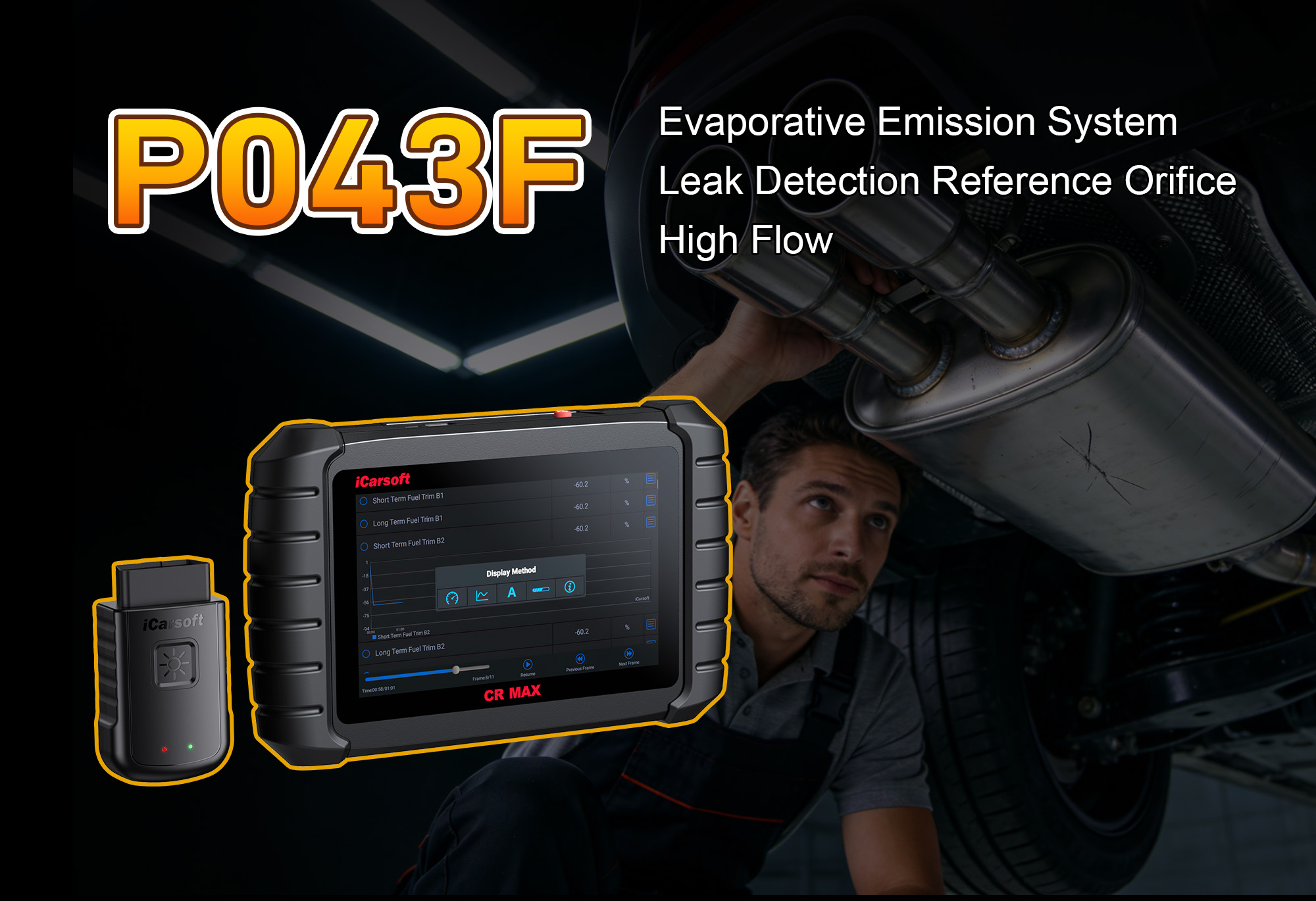Understand & Fix P0349: Camshaft Position Sensor B Circuit Intermittent with iCarsoft CR Ultra P
If your vehicle’s check engine light flickers, you experience random stalling, or notice rough acceleration that comes and goes, a diagnostic scan will likely return P0349. This OBD-II code stands for "Camshaft Position Sensor B Circuit Intermittent"—a critical fault targeting the secondary camshaft position sensor (CMP B) and its control circuit. The CMP sensor works with the Engine Control Module (ECM) to synchronize camshaft rotation with ignition timing and fuel injection. An "intermittent" error means the sensor’s signal cuts out, fluctuates, or becomes erratic under specific conditions (e.g., temperature changes, vibration), disrupting engine synchronization.
Basic scanners might only flag a "camshaft sensor error" but can’t capture intermittent signals, test circuit continuity under load, or validate sensor responsiveness—leaving you guessing between a faulty CMP sensor, damaged wiring, or a loose connector. The iCarsoft CR Ultra P, with its OE-level engine diagnostics, bi-directional control, and live data logging, solves this. Below, we break down P0349, its causes, symptoms, step-by-step resolution, and 8 FAQs to answer common troubleshooting questions.
What Is P0349?
P0349 focuses on the secondary camshaft position sensor (CMP B)—a component typically located near the camshaft (on the cylinder head or timing cover) in engines with dual camshafts (e.g., V6, V8, or inline-4 with dual overhead cams). CMP B works alongside CMP A to provide redundant camshaft position data to the ECM. The sensor generates a digital or analog signal as the camshaft rotates; when this signal becomes intermittent (drops out or fluctuates unexpectedly), the ECM triggers P0349. This issue often occurs under specific conditions—such as warm engine temperatures, high vibration, or wet weather—making it harder to diagnose with basic tools.
Key Symptoms of P0349
-
Flickering or Intermittent Check Engine Light: The light may turn on and off, especially during acceleration or temperature changes.
-
Random Engine Stalling: The ECM loses camshaft position data, causing the engine to shut off suddenly (often at idle or low speed).
-
Rough Acceleration & Misfires: Erratic sensor signals disrupt ignition timing, leading to hesitation or shaking when pressing the gas pedal.
-
Hard Starting: Intermittent data prevents the ECM from syncing fuel injection and ignition, making it difficult to crank the engine.
-
Reduced Engine Power: The ECM may enter "limp mode" to protect the engine, limiting acceleration and top speed.
-
Poor Fuel Economy: Incorrect timing from intermittent signals increases fuel consumption by 10–15%.
Common Causes of P0349
|
Cause
|
Description
|
|
Faulty CMP B Sensor
|
A worn sensor (with degraded internal electronics) or one contaminated with oil/carbon buildup generates intermittent signals.
|
|
Wiring/Circuit Issues
|
Frayed wires, corroded connectors, or loose terminals that lose contact under vibration or temperature changes.
|
|
Sensor Alignment Issues
|
The CMP sensor is misaligned with the camshaft reluctor ring, causing intermittent signal loss.
|
|
Timing Chain/Belt Wear
|
A stretched timing chain or belt changes the camshaft’s position relative to the sensor, disrupting signal transmission.
|
|
ECM Malfunction
|
Rarely, the ECM’s internal circuit for processing CMP data fails, misinterpreting normal signals as intermittent.
|
Why iCarsoft CR Ultra P Excels at Diagnosing P0349
The CR Ultra P outperforms basic tools with features tailored to intermittent camshaft sensor and circuit diagnostics:
Live Data Logging
Captures intermittent CMP B signals over time (even during test drives), highlighting dropouts that trigger P0349.
Bi-Directional CMP Testing
Activates the sensor manually to verify responsiveness, even under simulated load—distinguishes sensor faults from wiring issues.
Circuit Integrity Checks
Tests for loose connections, intermittent shorts, and continuity under vibration—critical for intermittent faults.
Topology Mapping
Visualizes the CMP sensor’s wiring and timing components, making hidden damage or misalignment easy to locate.
Global Vehicle Coverage
Supports 200+ passenger vehicle brands and 2018+ models with dual camshafts.
41 Hot Service Functions
Includes CMP calibration, timing chain reset, and ECM reset—critical for post-repair validation.
Step-by-Step: Diagnose P0349 with iCarsoft CR Ultra P
-
Confirm P0349 & Gather Data
Plug the CR Ultra P into your vehicle’s OBD-II port, power on the tool, and select AutoVIN Identify to auto-detect your vehicle’s make, model, and engine configuration.
Navigate to Engine > Fault Codes > Read Codes to confirm P0349. Tap Code Details for model-specific insights (e.g., "Toyota RAV4: Camshaft Position Sensor B Circuit Intermittent; Signal Dropouts Detected at 2500 RPM; Check CMP B Wiring or Alignment").
Use the CR Ultra P’s Data Logging function to record CMP B signals during a test drive—captures intermittent dropouts basic scanners miss.
-
Analyze Live CMP & Engine Data
Go to Engine > Live Data > Timing & Sensors and monitor three key metrics:
1. CMP B Signal: Should show a steady digital/analog signal. Intermittent drops to 0V or fluctuations confirm P0349.
2. CMP A vs. CMP B Signals: The two sensors’ signals should be synchronized. A mismatch indicates faulty CMP B.
3. RPM & Temperature: Note if dropouts occur at specific RPM (e.g., 2000–3000 RPM) or temperatures—narrows down the cause.
-
Test the Camshaft Position Sensor B (CMP B)
1. Use Bi-Directional Control > Engine > CMP Sensor Test: Send activation commands and simulate rotation. Intermittent responses = faulty sensor.
2. Locate CMP B: Use the CR Ultra P’s Component Location tool (typically near the rear cylinder head for Bank 2).
3. Inspect & Test: Check for oil/carbon buildup or loose connectors. Use the CR Ultra P’s Resistance Test (should match OEM specs, e.g., 1k–5k ohms—fluctuating resistance = faulty sensor).
-
Inspect Wiring, Connectors, & Timing Components
1. Wiring Check: Use Continuity Test and wiggle wires to simulate vibration—intermittent continuity = frayed/loose wiring.
2. Connector Check: Clean corroded terminals. Use the CR Ultra P’s Voltage Test to verify 12V power and ground to the sensor.
3. Timing Check: Inspect timing chain/belt for wear. Use the CR Ultra P’s Camshaft Timing Test to verify alignment.
-
Repair & Clear the Code
- Replace CMP B if tests confirm it’s faulty (use OEM-compatible sensors for signal accuracy).
- Repair damaged wiring, clean connectors, or adjust sensor alignment as needed. Replace worn timing chain/belt if required.
- Use the CR Ultra P to Clear Codes and run a Timing Synchronization Test. Log CMP B signals during a follow-up test drive to confirm no dropouts remain.
FAQs: P0349 Troubleshooting
Can I drive with P0349?
Short trips are risky—intermittent stalling increases accident risk. Use the CR Ultra P’s data logging to capture dropouts, then repair before driving long distances.
How much does it cost to fix P0349?
A new CMP sensor costs $50–$200, plus $100–$200 for labor (higher if the sensor is hard to access). Using the CR Ultra P to diagnose yourself saves on shop diagnostic fees ($100–$150).
Why does P0349 keep returning after clearing it?
The root cause is intermittent. Common culprits: loose wiring that shifts under vibration, a misaligned sensor, or a worn timing chain. Use the CR Ultra P’s data logging to track when the code reappears.
What’s the difference between P0349 (CMP B) and P0340 (CMP A)?
P0349 targets the secondary camshaft sensor (CMP B), while P0340 targets the primary (CMP A). The CR Ultra P’s AutoVIN Identify clarifies which bank/sensor is affected.
How do I distinguish between a faulty CMP B and wiring?
Use the wiggle test: Wiggle CMP B wiring while monitoring signals—intermittent dropouts = wiring issue; Wiggle the sensor connector—no dropouts + erratic signals = faulty CMP B.
Do I need to calibrate the CMP sensor after replacement?
Yes—use the CR Ultra P’s CMP Sensor Calibration (under Special Functions) to sync the new sensor with the ECM. This ensures proper timing synchronization.
Can wet weather cause P0349?
Yes—moisture can corrode connectors or short wiring, leading to intermittent signals. Use the CR Ultra P’s Voltage Test to check for water damage in the circuit.
Will P0349 fail an emissions test?
Yes—intermittent timing issues increase emissions. Fix P0349 with the CR Ultra P, drive 50+ miles to reset readiness monitors, and retest to ensure compliance.
Conclusion
P0349’s intermittent camshaft position sensor B fault is frustrating to diagnose, but the iCarsoft CR Ultra P simplifies the process with data logging, bi-directional testing, and circuit validation. It ensures you fix the root cause—whether it’s a faulty sensor, loose wiring, or timing misalignment—instead of just clearing the code.
With a 10.1-inch HD touchscreen, 12600mAh long-life battery, and 3 years of free software updates, the CR Ultra P is a must-have for DIYers and mechanics. Resolve P0349, restore engine synchronization, and drive without stalling—all with one professional-grade diagnostic scanner.





